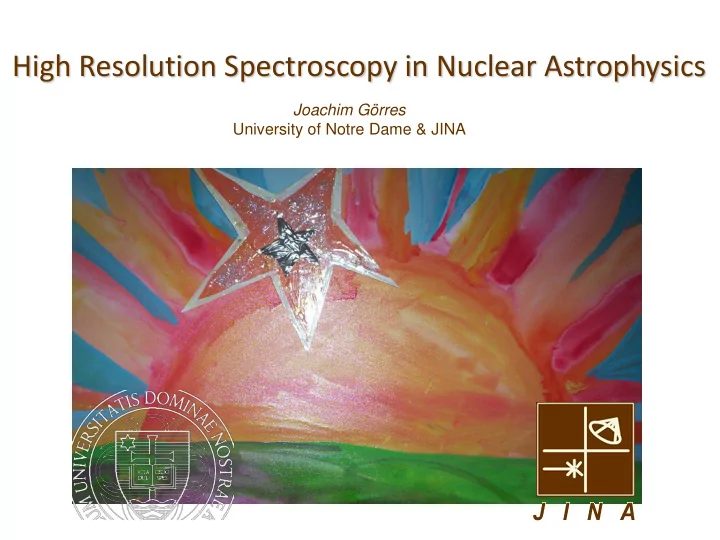

High Resolution Spectroscopy in Nuclear Astrophysics Joachim Görres University of Notre Dame & JINA
Nuclear Astrophysics Studies at RCNP Osaka – Notre Dame – Groningen Started in 2002 (Georg @ RCNP) with a series of (p,t) reactions explosive H burning in X-ray bursts in the α p-process indirect study of ( α ,p) reactions on the “waiting points” 18 Ne, 22 Mg, and 26 Si 75 keV energy resolution 13 keV
Since 2009: focus on the 22 Ne neutron source for the s-process indirect study of 22 Ne( α ,n) (s-process): ( α , α ’), ( 6 Li,d) and 25 Mg(d,p) Program very successful Collaborators 2 Master Theses (RCNP) Osaka H. Fujita Groningen Y. Fujita so far 3 PhD Theses! T. Adachi A. Matic K. Hatanaka 2 more coming up Y. Shimbara A. van der Berg A. Tamii K. Miki M.N. Harakeh A. Matic (IBA Particle Therapy) S. O’Brien (US Federal Gov.) R. Talwi (ANL)
Neutron sources for the s-process Main Component A>100 Weak Component A< 100 core He burning in massive stars low mass AGB stars T=0.3 GK T= 0.1 GK N n ~ 10 6 /cm -3 N n ~ 10 7 /cm -3 s-process at kT=25 KeV s-process at kT=8 keV Time scale: Time scale: Last few 10,000 years a few 10,000 years 22 Ne( α ,n) 13 C( α ,n) & 22 Ne( α ,n ) Shell C burning in massive stars T=1 GK N n ~ up to 10 12 /cm -3 s-process at kT=90 KeV Time scale: 1 year (not the “typical” s-process) 22 Ne( α ,n)
Core Helium Burning weak component of s-Process A<100 Hubble Space Telescope Betelgeuse
Simple “1-Zone” Model 12.6 million years
Shell Carbon Burning burns on the ashes of He-Burning 20 Ne+ α 12 C, 16 O, 20,22 Ne and 25,26 Mg ! 12 C+ 12 C main energy source: 12 C+ 12 C 23 Na+ p p/ α -ratio main neutron source: 22 Ne( α ,n) well known at 1GK residual from He burning how much is left at end of He burning? possible neutron source at end of burning: 25,26 Mg( α ,n) Small production branch: 20 Ne(p, γ ) 21 Na( β + ) 21 Ne(p, γ ) 22 Na( β + ) 22 Ne poison: 22 Ne(p, γ ) Most abundant isotopes at end of burning: 16 O, 20 Ne, 23 Na and 24 Mg
s-Process (Main Component A>100) TP-AGB Stars Chemical Evolution Large Mass Loss meteorite Fluorine Lines Observed inclusions On Surface of AGB Star 29,30 Si isotope ratios
Reaction Rates resonant reaction non-resonant reaction S(E) ≈ constant S(E) ≈ Breit -Wigner Resonance Strength: ! Γ p (E< < E C ) ~ exp(- k∙ E R -1/ 2 ) ! Gamow Peak
Indirect approach Γ α ∙ Γ n ω —————— ωγ = ≈ ω Γ α = ω S α Γ α sp Γ α + Γ γ + Γ n assuming Γ α , Γ γ /n << Γ n/ γ need to know: Spin and parity (natural J π ? ω ) excitation energy (see above) Γ α or S α from transfer reaction S α and Γ α sp are model dependent Γ n / Γ γ if both channels are open if Γ α is known, only relative value are needed! (see example later on)
22 Ne( α ,n) neutron source competition between ( α , n ) & ( α , γ ) reaction channels Q( α ,n) = -0.48 MeV NO ( α , γ ) below 832 keV resonance !! 630 keV J π =1 - resonance ?? Jaeger et al., PRL 87, 202501 (2001) present upper limit: < 60 neV
1 - ? 2009 1 + 1989 1 + 60 keV 26 Mg( γ ,n) 1969 Shown by Yoshi at a seminar on the occasion of his visit to Notre Dame !! ( γ , γ ’) 2009 Surprisingly enough: Latest compilation (NNDC 1998) still 1 + shows state without spin assignment
20 keV average spacing of states 25 Mg+n: new n-tof data Γ n / Γ γ : from 1000 10.998 10.978 to 10.945 10.927 10.915 10.893 1/10 10.881 10.824 1 + - 4 + 10.806 10.767 10.746 10.726 10.719 10.707 10.693 10.682 10.650 4 - - 7 - 10.646 1 + Below n-threshold: no widths and nearly no spins are known 234±2 keV = last known resonance at 831 keV Massimi et al 2012
First step: 26 Mg( α , α ’) @ 206 MeV Going to 206 MeV to learn about 206 keV ( α , α ’) populates preferentially natural parity states α - unbound 18 out of known 92 states n-unbound no unnatural parity state observed below α -threshold
Second step: 22 Ne( 6 Li,d ) @ 80 MeV n-unbound α - unbound
Result: n-threshold lowest known calculated calculated experimental from Γ α from ωγ resonance resonance strengths
Result: from n-tof experiment n-threshold upper limit from Jaeger ωγ αγ = 0.5 μ eV ! within experimental reach
Reaction Rates: ABG temperature 22 Ne( α , γ ) 22 Ne( α ,n) ( α ,n)/( α , γ ) General Impact: reduction of s-process synthesis but significant uncertainties remain
ABG Nucleosynthesis: Massive Stars (25 solar mass) Thanks to: S. Bisterzo M. Pignatari
Low Energy Alpha Capture Experiments @ Notre Dame St. George Recoil Separator ECR in terminal experiments are time consuming single ended knowledge from indirect 5 MV vertical search are very helpful accelerator
A Trip ip wit ith Yoshi i To Mi Minoh oh Wat aterfal all Yoshi shi’s ’s “small ll” w walk lk The “ “eas asy” w way ay from rom Mi Mino noh statio tion
Recommend
More recommend